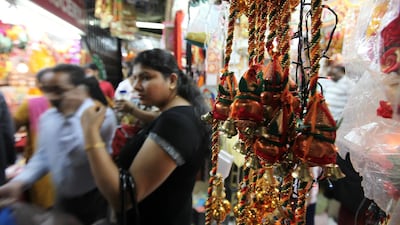Last week, during Christmas, the oft-quoted verse from St Luke's Gospel, "Glory to God in the highest, and on earth peace, goodwill toward men", had a particular resonance. Today, at the beginning of 2019, the UAE's Year of Tolerance, it has a relevance, too, with its underlying message of harmony.
Proud though both citizens and residents may be of the country’s philosophy of peaceful cultural and religious coexistence, the year ahead will provide opportunities for further reflection on what the concept of tolerance actually means. First and foremost, it isn’t based simply on the idea of accepting differences, in whatever manner they may be apparent. It is, rather, an active welcoming of the idea of diversity, of whatever origins, an acknowledgement of mutual respect. A recognition, too, that from that diversity come many of the strengths of our society. Within it, individuals and communities of different beliefs, cultures and origins all have a role to play and a positive contribution to make.
One challenge facing us in the Year of Tolerance is that of how to promote a greater understanding among our diverse communities that their contribution to society at large is both desired and desirable. Working within one’s own community, taking part in voluntary organisations that work with those who are disadvantaged, joining fund-raising activities to support the Emirates Red Crescent or similar bodies – these are but a few of the ways to take part. There’s sufficient variety for everyone.
It’s apparent from the success of TV campaigns to raise funds for disaster relief overseas that there’s an enormous reservoir of popular support for initiatives that do, indeed, provide opportunities to display goodwill toward men – and women. Over the course of the next year, I hope that we’ll see the emergence of yet more initiatives that allow people to demonstrate their commitment to others and, thereby, to show their support for the UAE’s philosophy of tolerance.
If we’re to see that achieved, though, it’ll be necessary to address one underlying issue – that of what exactly it means to be a part of the UAE and to belong to it. It’s easy enough for Emiratis: they are born to it. At the other end of the scale, there are those who have just arrived, or who plan only to stay for a short period of time in the country. The fact that they are in the Emirates may simply be the result of a career move that will last for only a few years. What, however, of those in between?
Last week, I was talking about UAE history to some non-Emirati students at the Dubai branch of a foreign university. In an attempt to get them engaged, I wove into the lecture numerous references to their own cultures and histories, along with the message that the UAE, with its longstanding heritage of maritime trade, has always been open to, and been influenced by, the outside world. It is not, and has never been, a closed society.
I asked how many of them had been born in the Emirates, and around half of them put up their hands. Then I asked how many of them felt that they “belonged” to the Emirates. Not a single hand was raised.
Looking back over the 47 years since the federation was created, it is clear that residents of varying origins have made enormous contributions, in innumerable ways, to the building of today’s state. Civil servants, bankers, sportsmen and sportswomen, engineers, doctors and nurses, teachers and shop-keepers, entrepreneurs and ordinary employees, as well as those involved in a variety of voluntary organisations – all have played their part.
Those who have contributed the most have not done so simply as part of their jobs, but because they developed a commitment to the broader task of national development. In a real sense, such people, even if they choose, after many years, to retire to their countries of origin or to move on elsewhere, have, indeed, developed a sense of belonging to the United Arab Emirates. They have done so, moreover, while retaining affection for their own countries – a matter of shared, rather than divided, loyalties.
That sense of belonging transcends, even if it does not wholly supersede, the legal qualifications of citizenship or nationality. Moreover, most Emiratis are only too willing to recognise and to welcome the fact that the country's progress has only been possible because of the contributions made by people of different faiths, cultures and origins. Indeed, recognition of that was an important part of the message and the legacy of the country's Founding Father, as we have been reminded during the Year of Zayed that has just drawn to a close.
During the Year of Tolerance, I hope that we’ll see more to encourage this sense of belonging. It has a crucial role to play in the promotion of the spirit of tolerance that underpins the nature of UAE society, welcoming all of us to play our part.
Peter Hellyer is a consultant specialising in the UAE's history and culture


